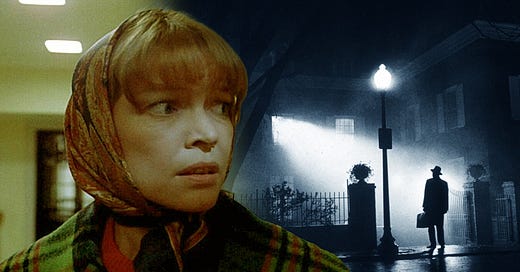New audio-only exclusive episode of Disaffected!
Join us for a discussion of what made 1969 (Rosemary's Baby) to 1981 (The Shining) the golden age of American horror films. Josh and George talk about 70s horror films as meditations on domestic abuse, and explorations of disordered personalities through the allegories of demonic possession and hauntings.
Featuring:
"Did you see her or not!? She's acting like she's f**ing out of her mind, psychotic, like a split personality or something."
—Chris MacNeal
"I'm gonna go now."
-Wendy Torrance
"He has his father's eyes."
-Roman Castevet
"It's all for you, Damian."
-Nanny
“You’re out the prom, Hargenson!”
—Coach Desjardin
Where do I find it? :
1. Right up at the top of this Substack post in the embedded audio player.
or
2. On your favorite podcast app. Disaffected is on all podcast distribution platforms.
BUT SUBSCRIBE TO DISAFFECTED ON AUDIO IF YOU DON’T WANT TO PISS OFF PAZUZU!






Ooh, super excited to listen to this. And I agree about the ‘70s being the golden age of horror movies. I loved scaring the hell out of myself when I was a pre-teen. 😱
Just listened and, like Josh, I could have gone for another two hours. You guys nailed it. Everything you said are things I have thought about movies (and not only horror movies) from the 1970s: the realistic sets and places, the non-stylized and regular looking people, the sense of reality even when the topic was something totally not in reality. Now I’ve got “Tubular Bells” going through my head.
Just started listening, very fascinating discussion. To me, these movies have a “smell” to them. I find them repulsive, but that speaks to the realism. I can never watch the Exorcist again because of that bloody cross scene. There is something to the manifestation of evil in our everyday lives, on an ordinary street, in an ordinary family. Evil is incomprehensible because of its hatred of humanity and its desire to degrade and demoralize.
I appreciate the domestic angle in this conversation. Were the writers suggesting that these children were made vulnerable to evil because of their parents’ actions? That’s up for interpretation. It’s clear, however, that these movies depict everyday domesticity with an overwhelming sense of tension. You can feel the sinister forces lurking. People, objects and places that are supposed to feel safe are no longer safe.